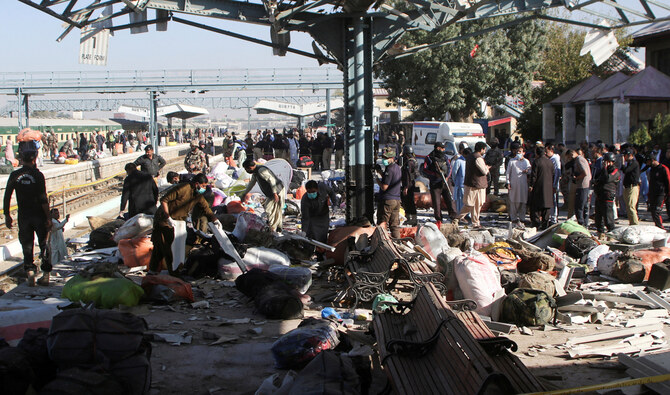QUETTA: Interior Minister Mohsin Naqvi this week resolved to eliminate the fresh surge in “terrorism” in the country after a bomb blast claimed by a separatist outfit in the country’s southwest killed at least 26 people on Saturday.
Officials said at least 26 people were killed and 64 injured on Saturday when a bomb blast struck a railway station in Pakistan’s southwestern city of Quetta.
The outlawed Balochistan Liberation Army (BLA) group, the most prominent of militant groups in Balochistan, took responsibility for the attack, the deadliest since a string of coordinated attacks on Aug. 25-26 in which more than 50 people, civilians and security officials, were killed.
In a statement shared with the media, the BLA said its suicide unit, the Majeed Brigade, had carried out the bombing to target a “Pakistani army unit” returning via train after completing a course at an infantry school. The claim has not yet been confirmed by the Pakistani military.
“We must battle this terrorism together. Apart from the Balochistan government and the federation, the people of Pakistan have to fight against it too,” Naqvi told reporters in Quetta at a news conference with Balochistan Chief Minister Sarfaraz Bugti by his side.
“And you will see, god willing as the chief minister said, we will eliminate this wave of terrorism.”

Passengers’ belongings are seen scattered on the platform after an explosion at a railway station in Quetta, in Pakistan’s Balochistan province, on November 9, 2024. (AFP)
The Pakistani minister reiterated that the federal government is standing by the Balochistan government and was providing full support to battle militancy in the country.
Later Pakistan Army Chief General Syed Asim Munir, Naqvi, Bugti and the governor of Balochistan attended funeral prayers for those who were killed in the Quetta Railway Station attack, the military’s media wing said.
Senior provincial ministers and a large number of military and civilian officials also took part in the funeral prayers at the Quetta Garrison before the deceased were laid to rest, the Inter-Services Public Relations (ISPR) said.

People mourn the death of their relatives outside a hospital following a bomb blast at a railway station in Quetta, in Pakistan’s Balochistan province, on November 9, 2024. (AFP)
“COAS [chief of army staff] highlighted that terrorism will never be tolerated and reaffirmed the nation’s resolve and commitment toward eradicating the menace,” the ISPR said.
“COAS emphasized that this mission will be pursued with full national resolve and collective determination.”
Munir stressed that the fight against “terrorism” requires the support of all Pakistanis, along with the efforts of the military and civil institutions, to secure a peaceful and prosperous future for the country, the ISPR said.

In this handout photo, taken and released by Pakistan’s Inter-Service Public Relations (ISPR), Pakistan’s civil and military leadership attend the funeral prayers of army officers, who were killed during a suicide bombing in Quetta early Saturday, in Quetta on November 10, 2024. (ISPR)
MILITANCY IN BALOCHISTAN
Balochistan is a resource-rich but impoverished province where separatist militants have been fighting a decades-long insurgency to win secession of the region. Insurgents say they are fighting what they see as the unfair exploitation of the province’s mineral and gas wealth by the federation at the center.

Blast victims get treatment in a hospital following an explosion at a railway station in Quetta, in Pakistan’s Balochistan province, on November 9, 2024. (AFP)
The Pakistani government and military deny they are exploiting Balochistan and have long maintained that neighbors such as India, Afghanistan and Iran foment trouble in the remote province and support and fund the insurgency there to impede its development potential. Balochistan is home to major China-led investment projects such as a strategic port and a gold and copper mine.
The rise of separatist attacks in Balochistan poses a major challenge for the weak coalition government of Prime Minister Shehbaz Sharif, which is battling an economic crisis and political instability as well as a rise in militant violence by both religiously motivated and separatist groups across the country.

People mourn the death of their relatives in a hospital following a bomb blast at a railway station in Quetta, in Pakistan’s Balochistan province, on November 9, 2024. (AFP)
Balochistan is also in the grips of civil rights protests by young ethnic Baloch who are calling for an end to what they describe as a pattern of enforced disappearances and other human rights abuses by security forces, who deny the charge.


















